America’s Fourth of July Safety Report: Fireworks, Alcohol, and Celebration Risks
Whether it’s family barbecues, fireworks, or road trips, Americans go all out for the Fourth of July. More than 60 million people hit the road in 2024, and another 11 million traveled by plane or train to make their holiday plans.
The holiday promises summer fun and long weekend getaways, but it also brings a surge in seasonal risks. Crowded roads cause traffic accidents to soar. Backyard celebrations can take a dangerous turn too, especially when fireworks are involved, sending thousands to the ER each year.
To uncover how Americans balance Fourth of July traditions and growing safety concerns, we asked 1,000 people how they plan to celebrate, what risks they’re worried about, and what steps they’re taking to protect themselves and their loved ones.

Key Findings
- 59% of revelers have seen unsafe fireworks use while celebrating the Fourth of July
- 91% don’t have a fire extinguisher nearby when lighting fireworks
- Nearly 1 in 3 Gen Z and millennials say they’ve been pressured into risky behavior
- 69% of people have seen someone try to drive drunk on the Fourth of July, but fewer than 1 in 3 stepped in to stop them
- Only 27% of Americans trust others to celebrate responsibly
- 15% would prefer an alien invasion to a work-related Fourth of July BBQ
What’s the Most Important Part of the Fourth of July for Americans?
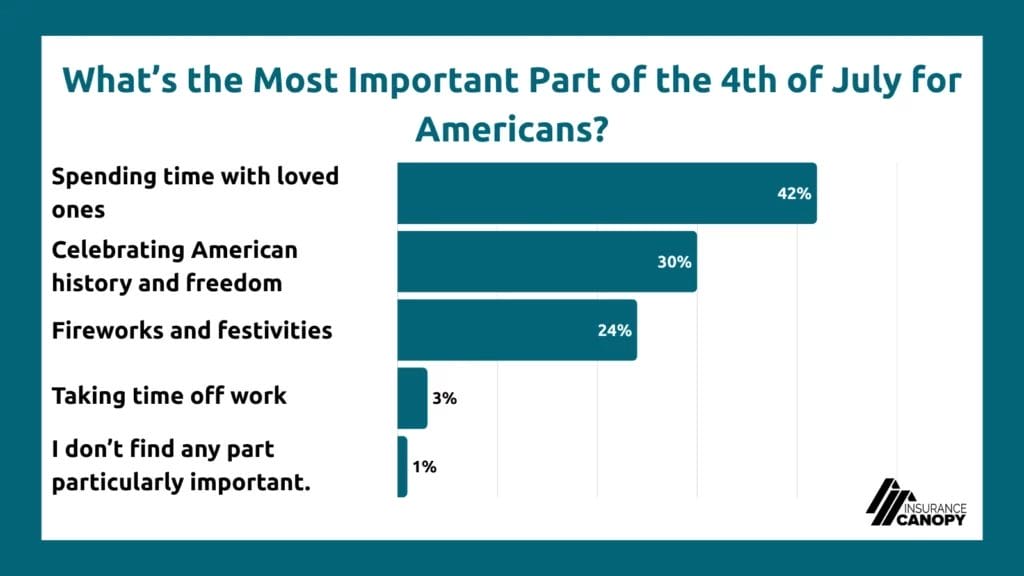
The heart of the holiday is simple: for 42%, it’s about spending time with loved ones. It’s more important than celebrating American history (30%), seeing fireworks (24%), or even having time off work (3%).
But the priorities shift fast when you break things down. Women are more into the fireworks shows (28% vs. 20%), while men prioritize patriotism (34% vs. 26%).
Baby boomers stand out as the most patriotic generation. Nearly one in four baby boomers, 38%, say honoring the nation’s history is their top priority, compared to just 26% of millennials.
What Firework Safety Measures Are Americans Taking?
59% say they’ve attended celebrations where fireworks were handled recklessly on the Fourth of July.
It’s one thing to see someone shooting off fireworks in a dangerous manner, but it’s another to do so yourself (and only 8% actually admit to it). However, that risk isn’t evenly spread; some groups are far more likely to participate in the chaos firsthand.
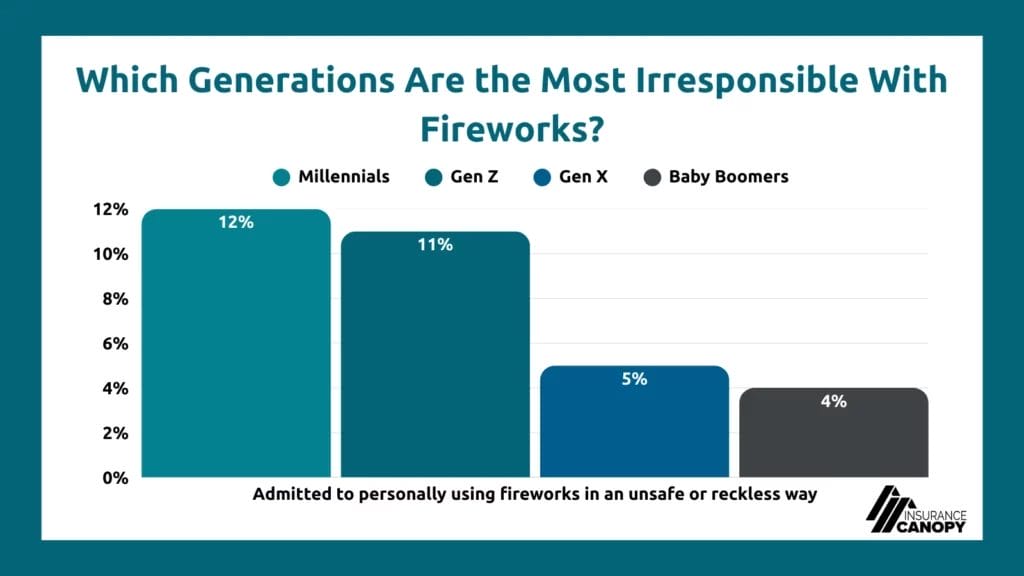

Men (12%) are three times more likely to be irresponsible with fireworks than women (4%). Millennials (12%) and Gen Z (11%) are also more likely to take risks with fireworks than Gen X (5%) and baby boomers (4%).
Careful or not, a lot of people don’t go out of their way to take precautions when lighting fireworks on the Fourth of July. 91% don’t have a fire extinguisher on hand, and a whopping 96% fail to use protective eyewear.
To minimize risk, 20% of viewers only watch professional fireworks shows. And 48% of people choose to keep their distance, regardless of who’s lighting the fuse.
How Much Are Americans Spending on Fireworks in 2025?
76% plan to buy fireworks for the Fourth of July this year. But some feel more enthusiastic about this than others. 83% of men plan to make such a purchase vs. just 70% of women.
Younger generations are especially eager to stock up. Here’s how they compare to older ones:
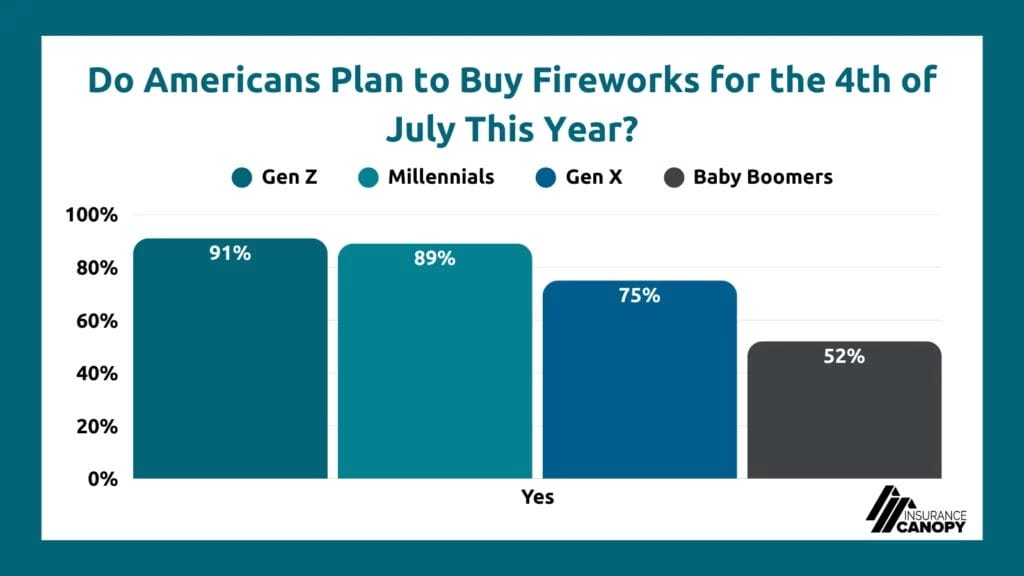
How Do People Feel About Neighbors Lighting Fireworks Nearby?
78% say they’re fine with fireworks in their neighborhood, despite the risks. But 22% admit they’re annoyed or want the backyard displays banned altogether.
Generationally, Gen Z (91%) and millennials (85%) are the most supportive of amateur displays, while only 64% of baby boomers say the same. Older, wealthier Americans are likely to be the most vocal about reducing the use of fireworks in neighborhoods.
When it comes to banning fireworks altogether, income plays a key role. 15% of those earning $100,000+ want neighborhood fireworks banned, while just 6% of people earning under $50,000 agree.
This class divide may be tied to perceived risk: higher earners are also more likely to witness fireworks used recklessly.
Are Americans Buying More Alcohol for the Fourth Than Last Year?
75% are buying alcohol for the Fourth of July this year. This trend has serious safety implications for all revelers, as drunk driving played a role in 38% of traffic deaths over the holiday in 2023.
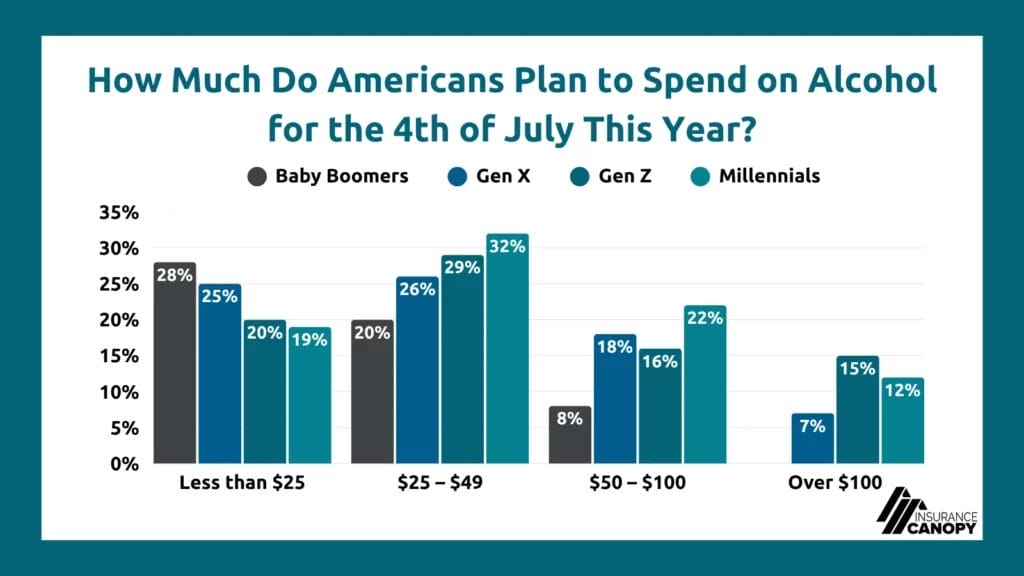
But buying a favorite beverage doesn’t always mean overindulging. Most people (68%) plan to spend less than $100, and nearly a quarter (23%) will spend under $25.
Looking ahead, alcohol habits are holding steady: 47% plan to buy the same amount as last year, while 17% will buy less and 12% plan to buy more.
Older generations aren’t hitting the bottle quite as hard as their younger counterparts. Here’s who’s skipping alcohol this year:
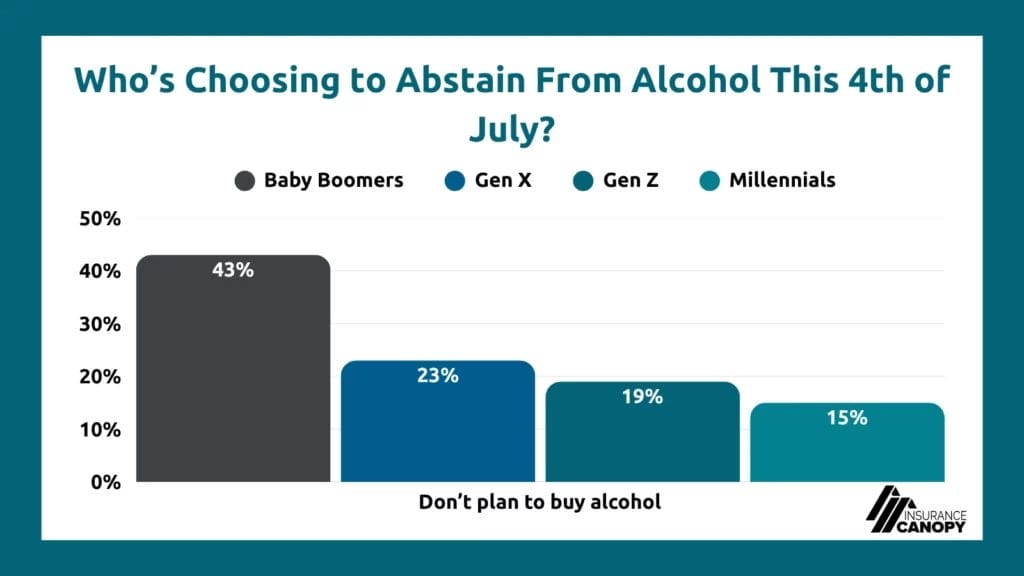
Though Gen Z drinks slightly less than millennials, they’re still far more likely to celebrate with alcohol than baby boomers.
How Common Are Alcohol-Related Incidents on the Fourth of July?
16% of Americans say they or someone close to them has experienced a serious alcohol-related event (like driving drunk, getting into a fight, or getting hurt by a firework) on the Fourth of July.
Here are the most common issues:
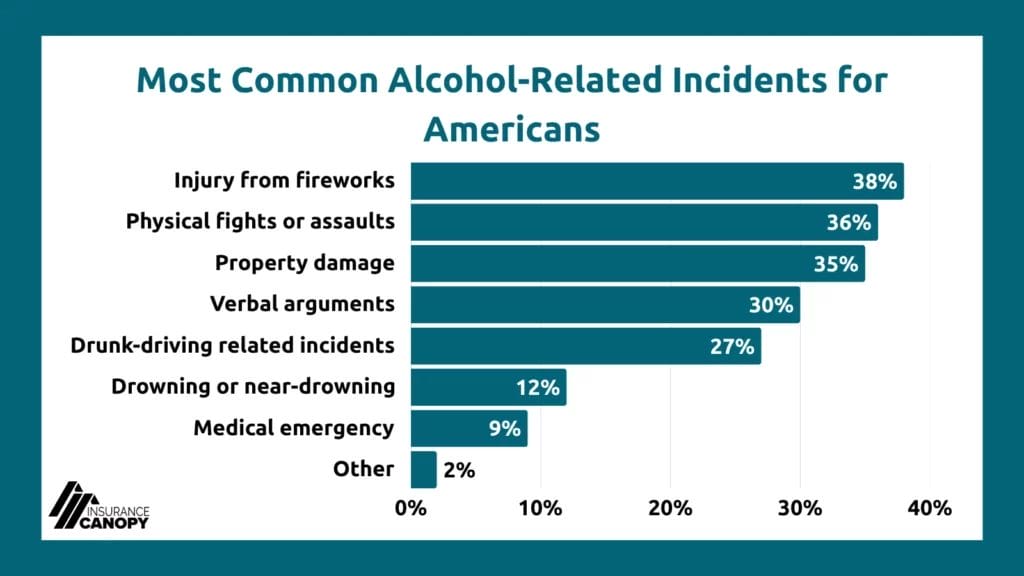
Alcohol-fueled incidents hit younger generations the hardest. One in four millennials and one in three Gen Zers have experienced them firsthand, compared to just 9% of Gen X and 4% of baby boomers.
How Many Americans Risk Drunk Driving on the Fourth of July?
Many people drink alcohol on the Fourth of July holiday, and a terrifying 1 in 5 are illegally getting behind the wheel after knocking a few back. Unfortunately, this dangerous behavior is even more prevalent among certain groups.
Men are significantly more likely than women to drive after drinking (25% vs. 12%), and even to drive while over the legal limit (13% vs. 4%).
Amid the red, white, and blue, there’s a gray area: what do people do when they see someone else trying to drive drunk? It’s a decision 69% have had to make. 40% chose to intervene, but 29% let someone illegally take the wheel.
Which Fourth of July Risks Concern Americans the Most?
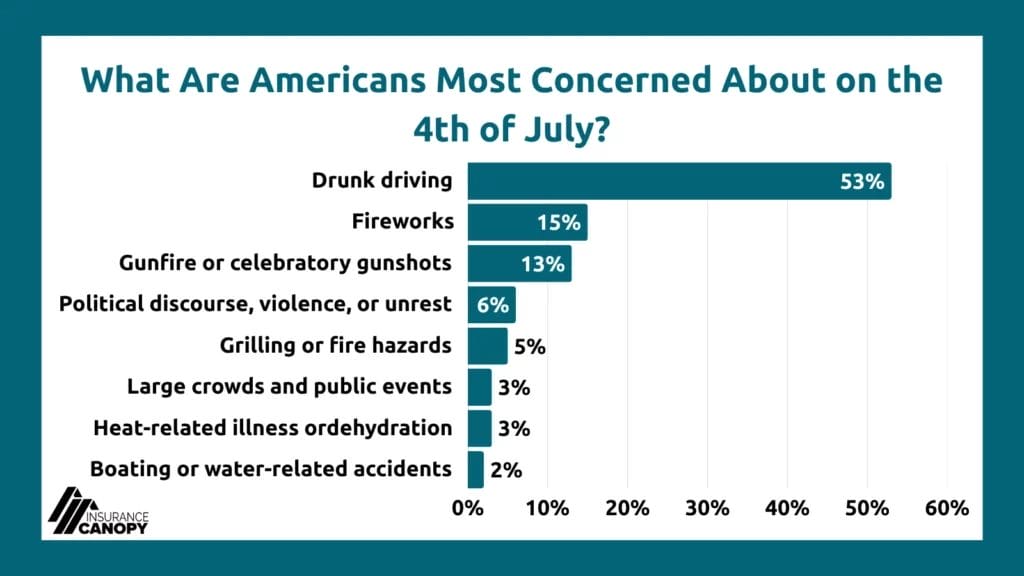
Where Do Americans Feel the Safest on the Fourth of July?
63% steer clear of bars, nightlife venues, and crowded public events due to safety concerns. Here’s where people are most likely to say “no thanks” when danger feels too close for comfort:
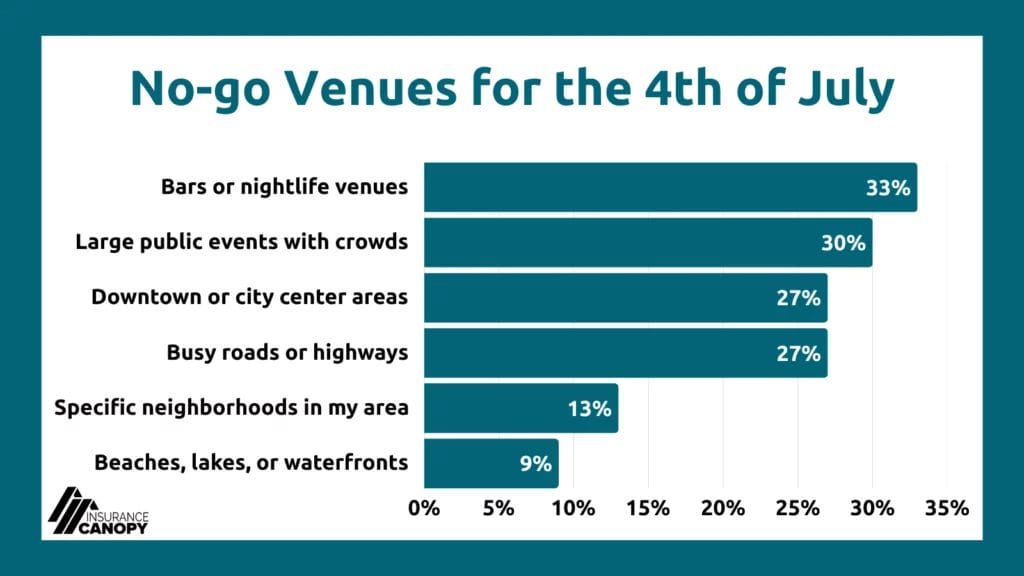
19% of people claim they don’t avoid any places for safety reasons. 18% prefer to stay home on the Fourth of July, so they don’t need to safety at celebrations at all.
But these homebodies aren’t outliers. A full 79% of Americans feel safest celebrating at home with friends and loved ones, far away from public crowds.
That said, younger generations who do venture out are more at ease in public spaces than older ones. In particular, 20% of Gen Z feel safest at public events, compared to just 8% of baby boomers.
What Makes People Feel Unsafe at Public Celebrations?
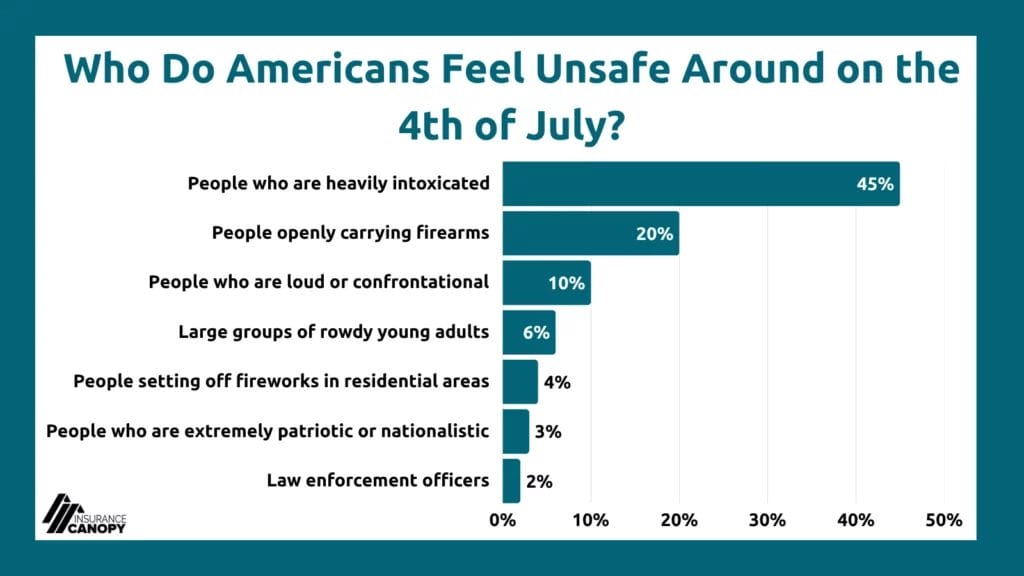
Why do two-thirds of people feel safest at home? The top concern is being around heavily intoxicated people. This is closely followed by fears of encountering aggressive or confrontational behavior and individuals carrying firearms.
These rank as the top three concerns across every generation. Though large groups of rowdy young adults and fireworks being used irresponsibly also made the list of major worries.
Do Americans Trust Others to Celebrate the Fourth of July Safely?
More than half (52%) of revelers don’t trust strangers to act responsibly on the Fourth of July, and 15% say they don’t trust anyone, not even their own friends or family. Only one in four Americans trust their fellow citizens to celebrate responsibly.
What Are the Most Dangerous 4th of July Behaviors Americans Admit To?
1 in 5 respondents feel pressure to do something dangerous to celebrate the Fourth of July. That pressure ramps up for younger generations. One in three Gen Zers and millennials admit they’ve actually gone through with something risky on the holiday.
The same trend holds for men, who are 65% more likely than women to take part in dangerous behavior in the name of celebration.
Risky behavior isn’t just more likely among men, it’s more common, too. 28% of men say they’ve been pressured into perilous actions, while only 17% of women have engaged in the same unsafe conduct.
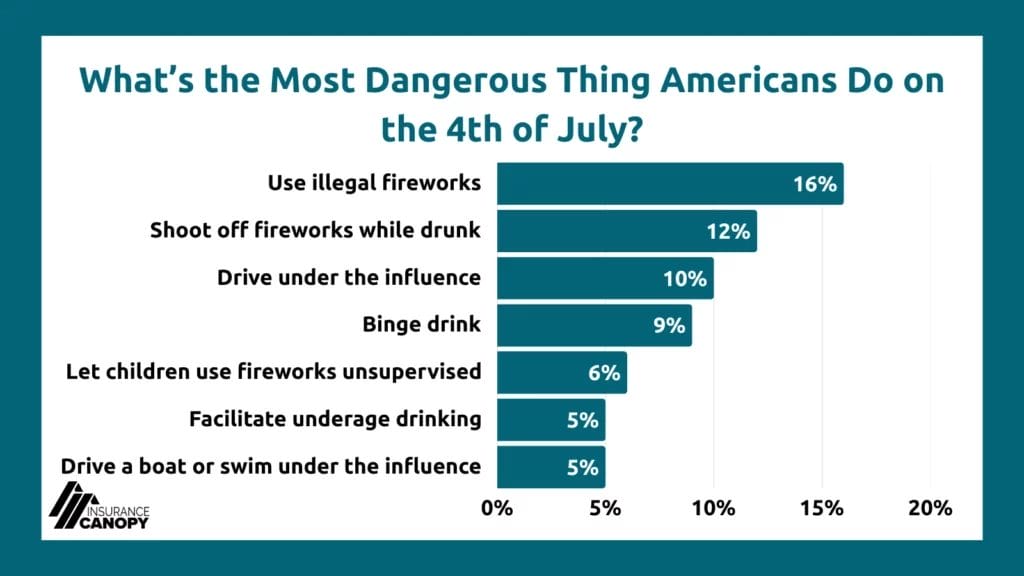
Although three out of five claim to not be involved in dangerous behavior, the minority can ultimately ruin the holiday for the majority.
Are Fourth of July Celebrations Safer When Children Are Present?
You might assume people would celebrate more responsibly on the 4th when kids are present. But 20% don’t change their behavior at all, even if they’re getting up to something dangerous. Another 23% admit they’re only slightly more cautious if kids are present than they would be otherwise.
Do Safety Concerns Affect Americans' 4th of July Plans?
29% have never changed their Independence Day plans due to safety-related concerns. Another 14% considered canceling or skipping festivities because of potential dangers, but said they wound up going anyway.
What safety concerns or dangers are most likely to cause America’s Fourth of July plans to change?
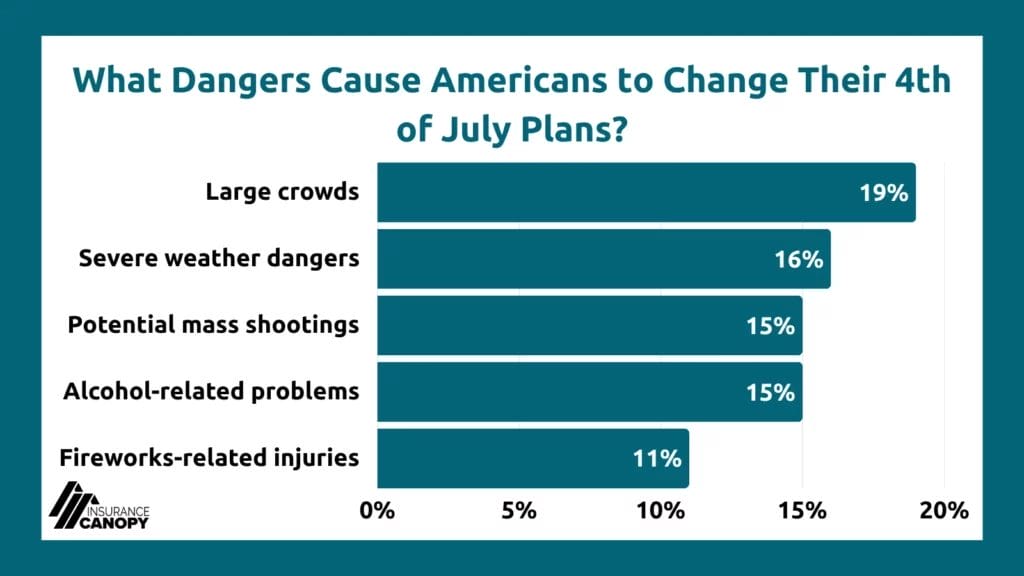
Older Americans are much less likely to change plans. 33% of baby boomers say they’ve never changed their 4th of July plans due to safety concerns, compared to only 16% of Gen Zers.
This gap tracks with research that shows Gen Z is more worried about safety issues like gun violence than older Americans.
Do Americans Trust Event Hosts and Venues to Keep Guests Safe?
29% believe guest safety isn’t a priority for bars and event organizers hosting Fourth of July festivities.
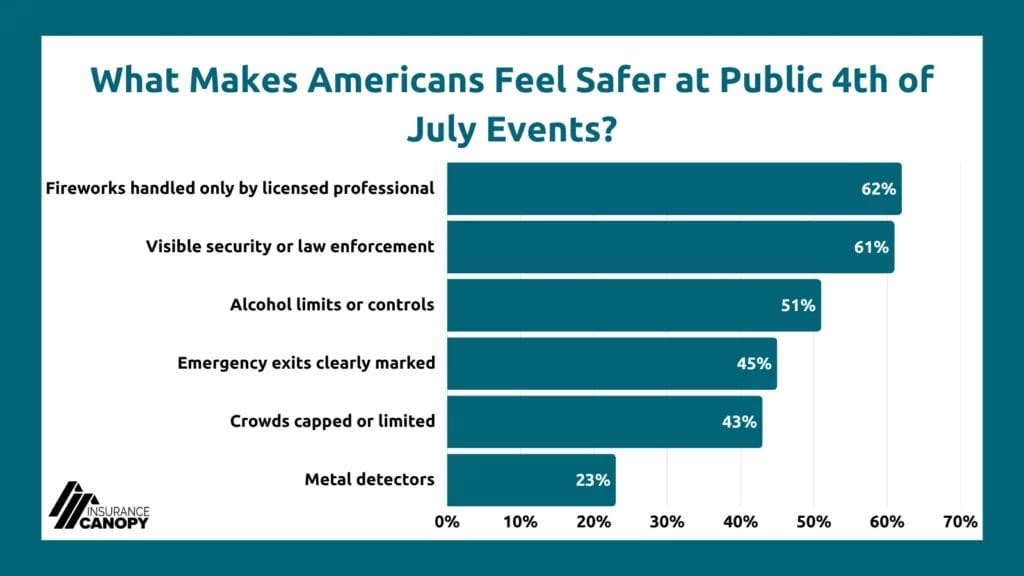
What can venues do besides deploying security personnel, having safety policies, and planning for crowd control? Nearly half of attendees (48%) would feel safer if venues hosting Independence Day events had general liability insurance.
That makes general liability insurance a key part of the larger safety plan. While a policy alone won’t guarantee that nothing bad happens, it can give attendees peace of mind that they’ll have support if something goes wrong.
What Would Make Public Fourth of July Events Feel Safer?
Though 56% say they’d feel less safe if people openly carried guns at a Fourth of July event, one in five say it would actually make them feel more secure.
One in four don’t feel strongly either way. This echoes the divide over how firearms are perceived in public celebrations, especially as crowd safety concerns rise.
Baby boomers, in particular, don’t care for events with open-carry policies. Among older Americans, 79% say they’d feel less safe (but this figure drops dramatically to 48% for Gen Z).
What Would Americans Rather Endure Than a Mandatory Company BBQ on the Fourth?
The Fourth of July should be about freedom… but apparently, not the corporate kind.
Though 65% of Americans are fine with company Independence Day events, one in three would rather live through a blockbuster-level apocalyptic disaster than attend a mandatory work BBQ. In fact, mandatory company BBQs are so bad that 15% of Americans declare they would rather be vaporized by aliens.
Among the more dramatic alternatives:
- 15% would prefer an alien invasion (Independence Day)
- 6% would rather be chased by a killer (I Know What You Did Last Summer)
- 5% choose a zombie apocalypse (Return of the Living Dead)
- 5% would rather be attacked by a shark at the beach (Jaws)
- 4% would rather help hack the national power grid (Live Free or Die Hard)
The Fourth of July is an important holiday for relaxation, road trips, and bonding with loved ones. However, dangers from fireworks, alcohol use, and driving can derail the positive vibes. And while no one can eliminate every risk, most are taking steps to keep disaster at bay and protect the good times.
Methodology
This survey was conducted on May 2, 2025, and included 1,000 Americans across the country. The survey asked about people’s plans for the Fourth of July, their safety concerns, what they plan to do to increase safety, and what they want venues and authorities to do to protect them and give them peace of mind. Demographic data allowed for analysis across regions and generations to better understand how Americans feel about Fourth of July safety in 2025.
Fair Use Policy
You’re welcome to use the insights and findings from this study for noncommercial purposes, such as academic research, educational presentations, and personal reference. When referencing or citing this article, please ensure proper attribution to maintain the integrity of the research. Direct linking to this article is permissible and encouraged to facilitate access to the original source of information.
For commercial use or publication purposes—including but not limited to media outlets, websites, and promotional materials—please contact the authors for permission and licensing details. We appreciate your respect for intellectual property rights and adherence to ethical citation practices. Thank you for your interest in our research.
